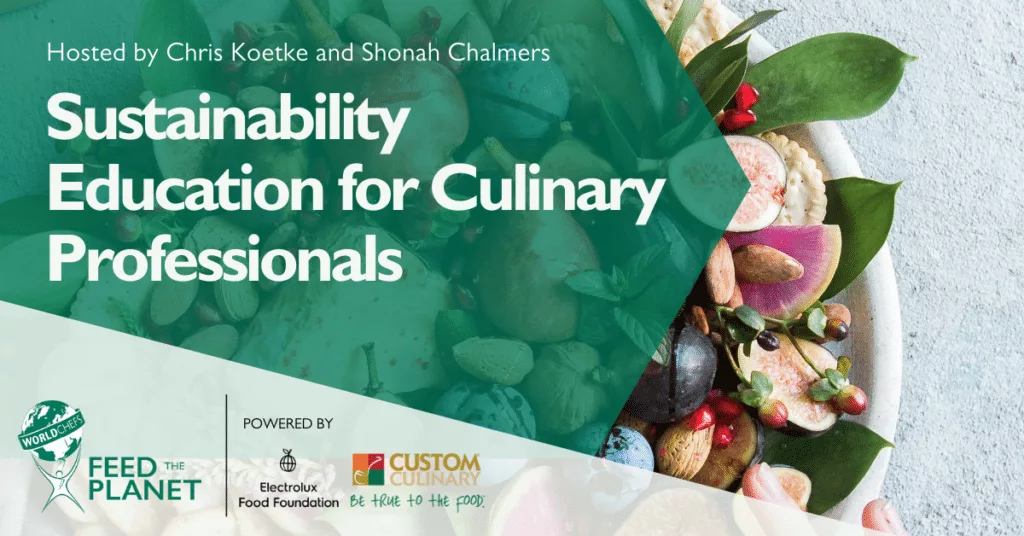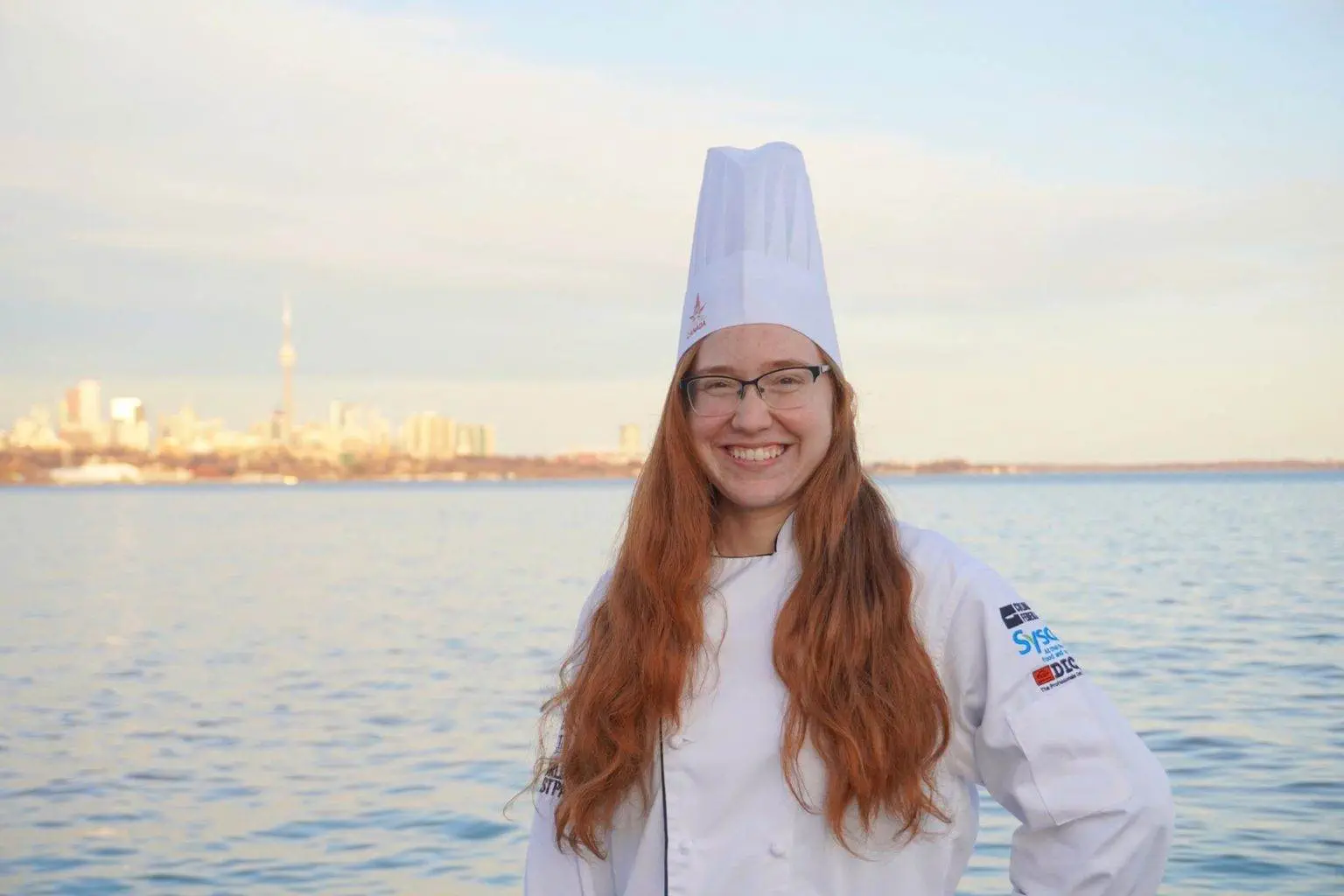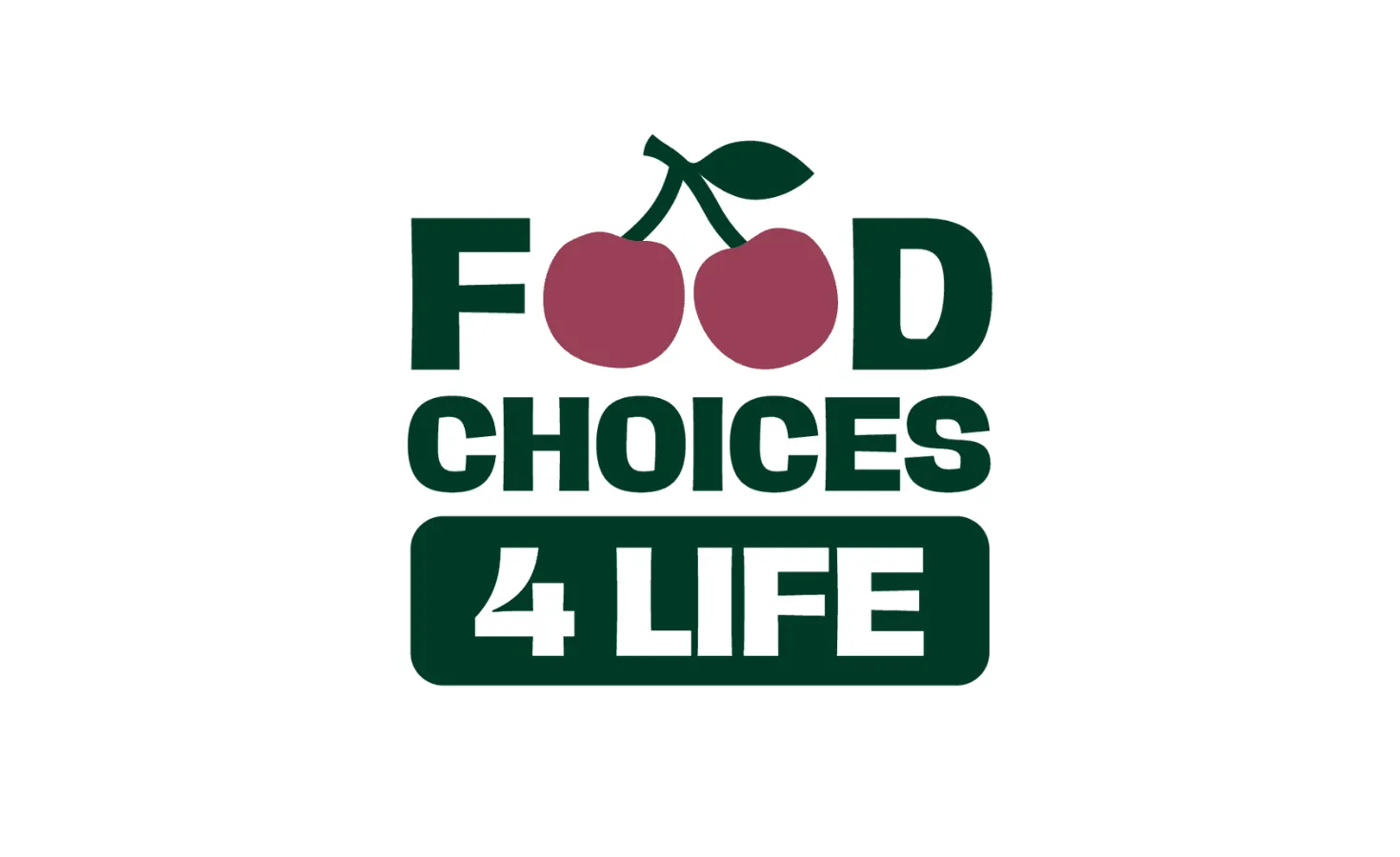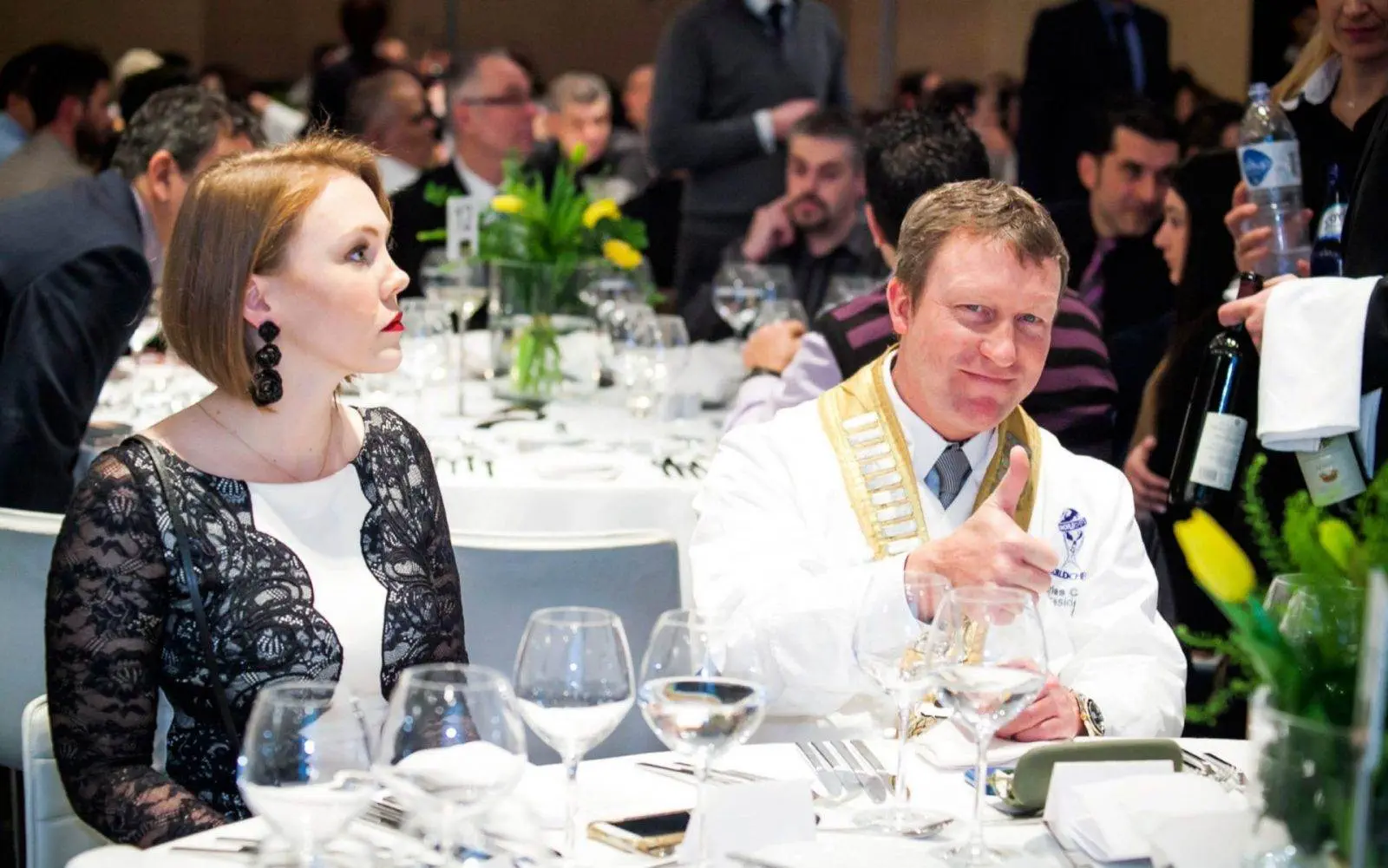Young Chefs Are Taking the Industry Back to School: In Conversation with Rebecca van Bommel, Worldchefs Young Chefs Ambassador
What do the next generation of industry leaders have to say about key challenges for the future? We hear from Rebecca van Bommel, an up-and-coming culinary voice and one to watch. Her early career already has an impressive résumé: Worldchefs Global Development of Young Chefs Committee member, Culinary Federation Canada’s Young Chef Liaison, Red Seal Certified Young Chef, and competitor with Culinary Team Canada. She shares her insights to help pave the way for young people in hospitality.
How did you wind up in this profession? What was your pathway?
I knew from the start that I wanted to pursue something in the culinary field. I’ve always loved baking, making different desserts for my family and friends, cooking. As soon as I finished high school, I went straight into a two-year culinary school program and that just solidified the passion I had for the industry and how much I loved it. From there, I did some apprenticeships in Ireland and really enjoyed that as well, and just kept cooking. I did a few different avenues—hotels, local pubs, a Michelin star—and then COVID hit and the industry slowed down a bit. Some chefs I had been working with previously on a contract basis at food shows reached out to me and had a food sales position open. And that’s how I transitioned over into that avenue. I’ve been enjoying it.
What do you love about being in the food broker world?
The food broker world I love because you get to see behind-the-scenes. I get to interact and talk with different chefs every single day, talk to them about what products they’re using and why, and get a little insight into their restaurant or their business and how they run things and what they prefer. It’s really cool for me, coming from a chef background, to get a behind-the-scenes look into different chefs’ lives, so that’s been enjoyable for me.
You also cook at a retirement home. What is unique about serving that market?
Working in the retirement community, that opportunity also presented itself during COVID. I got into that world and realized—wow—they make really good food. We serve steak, we serve lamb, we serve lobster tails to our residents.
Depending on the restaurant, you often don’t get to talk to the people who are eating your food. Retirement is completely different because it’s the same people every single day, and you can actually build a relationship with them, find out their likes and dislikes. There’s a lot of creativity allowed in retirement. You’re not making the same dishes every day like you would often in a restaurant. Every day is different. And you can take what the residents are telling you, what they love, what they don’t love, and take that into account and create amazing food for them.
Competition—it’s something you do a lot at a very high level. Any lessons learned from the competition world?
I did my first competition while I was still in culinary school. It was a small, local one. I said, ‘I’ll do this just for fun. See where it goes. Just have fun with it.’ I got 1st place. And then I was kind of like, oh, this is fun.
It’s a good stress. It’s a stress, but it’s a stress that motivates you to want to try better. Segueing from that competition, I was invited to compete at the Culinary Olympics on a regional team. And that was probably the most stressful summer of my life—the practicing and preparing—and I said, ‘I will never do this again. This is not worth it.’ But then we got to IKA. Just to see all the other competitors and how big it is, and how proud you feel. Now I’m on my third Culinary Olympics team, and I don’t think that’s over any time soon.
Let’s jump into the world of sustainability. Where are our young people in this equation?
I think young chefs especially are extremely aware about sustainability in the industry and in their careers. I know it was something we talked about when I was in culinary school and how important it is to prevent food waste. Food waste is a huge part of it, and I think young chefs for the most part are very much aware and try to do their best about that. Another big factor is plastic waste, which again resurfaced with the pandemic because there was a lot of single-use plastics that were necessary at the time.
Young chefs are definitely aware of it and know that in order to have a bright future it’s something that they need to be mindful of on a daily basis. The issue with young chefs is sometimes they don’t have the support in their jobs to be able to do those types of things.
Are they empowered to make that change?
I would say it largely depends on what type of restaurant they’re in. For example, I’ve worked in a small local pub that got a lot of their ingredients from local farmers, and we used everything we could. We’d use carrot tops to make pesto and if we were to get fresh meat in, we’d use every part of the animal.
But then on the other hand, you have things like fine dining and Michelin stars, where they’ll make a square pan of something and cut out circles, and then you have all this waste. Or they’ll only pick the most perfect-looking carrots to put on the plate because of course we eat with their eyes first, and that’s important for that level of dining.
I think it depends on where they’re working. Young chefs in a smaller, independent restaurant would feel more empowered than say, a Michelin-starred restaurant where there’s that level, that standard that they have to keep up. And it’s so much harder to do that sustainably.
How about in competition?
With competitions it’s very hard to keep it sustainable, especially with the number of practice runs you have to go through to get to the competition. But I know even in the rules and the judging criteria, they’re becoming a lot more mindful of that.
In the past, where you might have used plastic tasting spoons, now the standard is to use wood or bamboo, something compostable. Same with sorting waste. They really focus on that. If you have trim from vegetables that you could use in a soup or use in another dish—save that, set it aside, put that to use. It’s a big focus, but it’s hard to do.
Another thing we try to do on our team—one of our competitions is cooking for 110 people. If we’re going to do a practice run, we want to find either 110 people we can feed so that food is not going to waste, or somewhere we can donate the food.
What would your advice be to a young person who wants to do things sustainably at a workplace where that’s not a priority?
I would say to start with a small change, because even the small things make a difference. You’re not going to change the chef’s mindset overnight and suddenly everything’s going to be sustainable. But if there’s one little thing, one little practice in the restaurant where you could suggest a more sustainable alternative, start with that. And that might open the doors for future conversations. That might get the chef thinking as well, ‘What else could I do? That was an easy change that didn’t affect the quality of my food at all. What else could I do to be more sustainable?’
Is sustainability something that is top of mind for young chefs looking for a place to work?
It’s hard to speak on behalf of all young chefs, but I would say sustainability isn’t necessarily top top. It’s definitely cuisine, style, food, and skill. But there is a niche in restaurants that are nose-to-tail or farm-to-table. In that sense, a lot of young chefs look for those types of establishments and want to work there, and those are more sustainable establishments naturally.
I don’t think they go in looking for sustainable businesses, but they might go looking for something that operates in that sense, where they’re very mindful of using local fresh ingredients and using every part of the ingredient.
What do you want to see from employers today?
Young people, we’re kind of driven by low risk, high reward. Going back to the pandemic as well, when a lot of chefs didn’t have work because restaurants were closed, it gave them a chance to breathe and a lot of them realized, ‘Why am I doing this to myself? Why am I working crazy, long hours, no days off? Really tough work environments, stressful work environments, no breaks. Why, when I could have better work-life balance?’ I think the pandemic brought that into focus. The working conditions that are typical of our industry, I’m not saying everywhere is like that but it’s kind of classically how it’s been.
There’s a big lack of workers because young chefs have realized ‘I don’t want this life anymore and if you can’t give me a more balanced schedule, some benefits, health benefits or otherwise, and better pay, I’m going to go to another industry.’
Do you think the foodservice community is doing enough to support young people as they grow into this profession?
A resounding no. What young chefs are looking for, and I hate to say it this way—money is a huge driver because at the end of the day, if you can’t put food on your own plate, why are you going to spend your time putting food on other people’s plates?
There are a lot of supports in place, like from Worldchefs, but when it comes to the actual work side of things, the typical environment, especially in restaurants, in the culinary industry, it’s not supportive of young chefs.
Can you give us one piece of advice for young chefs, and one piece of advice for those of us who have been in the industry for quite a while longer?
The piece of advice I have for young chefs I’m borrowing from one of my instructors in culinary school who told me this and it hit home and enhanced by experience as a young chef.
Take advantage of every opportunity that comes your way. Volunteer for everything. If you’re in school and there’s an event happening and they need two volunteers, put your hand up and join. If they’re having an amazing guest speaker but you have to give up your Saturday afternoon, go to that guest speaker. It’s going to enhance your experience and enhance your education. You can go to culinary school and pass all the courses and get the diploma, but if you haven’t gone above and beyond and done all the extras and joined competitions, you’re not getting the same experience as someone who has.
Go online, go to Worldchefs, take part in these webinars, take part in these free courses, especially the sustainability ones because that’s where the future’s going. And do all these extra things and you will have so much more knowledge and so many more tools to empower you going out into the workforce.
And for the more established generation of chefs?
Listen to the young chefs. While more accomplished chefs, of course they have a world of experience. They’ve been here, they’ve been there, they’ve done this and that in many competitions and cooked in many different places and have tons of knowledge and experience from that.
But still, keep in mind to listen to the younger generation of people who aren’t so established, people just starting out. They also have very valuable ideas and valuable knowledge themselves and can teach you things that you may not have even thought of. Sustainability would be a huge one of those because it’s something we think about a lot more and we grew up with and know more about that we could teach to you.

Young Chefs get a discounted rate to Worldchefs Congress & Expo 2024, in Singapore this October! Don’t miss the Bill Gallagher Young Chefs Forum and your chance to connect with industry leaders!
Looking for more ways to get involved with an international community of motivated Young Chefs? Learn more about Worldchefs’ Young Chefs Club here.
Learn more about Worldchefs’ Feed the Planet programs at www.feedtheplanet.worldchefs.org.

Start your journey towards a more conscious kitchen with Worldchefs’ FREE online Sustainability Education for Culinary Professionals course on Worldchefs Academy! Learn about key topics in food systems at your own pace, and give your career a boost with a valuable digital badge to show you’ve completed the training program.
Feed the Planet is powered by our friends at Electrolux Food Foundation. Visit the Electrolux Food Foundation website here and explore Replate at replate.com.






